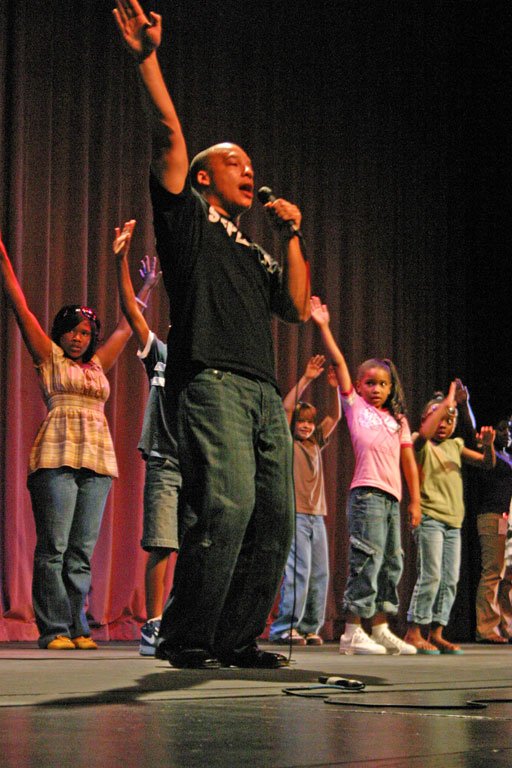Step Afrika! cast members taught audience members how to step at Saturday's performance. Photo by Maggie Burks
"Step Afrika! is back," sounded from the dark stage, echoing to the back walls of the Rose E. McCoy Auditorium at Jackson State University Saturday night. As the stage lights became brighter, revealing seven figures, audience members cheered and clapped. Shaking long dreadlocks and fros as they moved along the stage, the cast members of Step Afrika! created beats and rhythms with their feet and hands.
Between skits, cast members pulled people from the audience to teach a basic stepping piece and let them perform it. When they asked for six or eight volunteers, hands shot up in the air, fighting with ones next to them for the chance to go on stage. Mixing funny skits, like one depicting the pledging process in the early 1900s, with documentary film shorts explaining the art form itself, the cast delivered a high-energy show.
Founded in 1994 by Brian Williams, the cast of dancers is compromised of young, vibrant dancers, actors and singers, whose goal is, primarily, to teach through song and dance. After the group performed on Saturday, June 21, I talked to Williams and two cast members, Ryan Johnsona student at Towson University in Maryland, and Brian McColluma Morehouse College graduate working toward a master's of divinity at Princeton University.
It seems like education is a huge theme in what you are doing. Why is it important to educate your audiences?
Williams: Because we feel that stepping is an art form, and was created, first and foremost, by college students. It's not a dance form for dance sake; it's a dance form that came out of a particular experiencea fraternity or sorority experience. These students who created stepping were students first, and stepping was the aftermath, or the result, of them becoming members of these groups. For us, we can never do one without the other; we just can't perform without educating. And we can't just dance without teaching. Both have to be done.
How have you seen the group change and grow since you started in 1994?
Williams: Well, now we have a lot of cast members. You know, when we first started, it was mostly the fraternity that did the work, out of Howard University, with a few young ladies. And it was really about the work in Johannesburg. We were in South Africa in 1994, six months after the election of Nelson Mandela to president. It was a very different time in South Africa, (with) a lot of change going on.
We were in Soweto, which is a historic township, working with young people the first time many of us had been overseas. And so, the initial idea of Step Afrika! was to be a festival where we would exchange culture and dance forms with the continent of Africa. But, what started to happen is, when we got back on this side of the Atlantic, we noticed there was a need to teach our own children here.
How much changeover have you had in the cast itself over the years?
Williams: Not too much. This is a new thing for steppers to be making a career out of it, and that's been kind of a challenge, but we're starting to see people who can understand that it is a viable career path, a viable art form to pursue, and we're glad to be kind of pioneering this, because we think that, after we're finished, I'm sure there will be other steppers who pop up, but we'll be the ones who launched it as a dance form.
Do you work school visits into your touring schedule?
McCollum: Well actually, we have three major shows: (One of them is) the young audience show, and that show is usually for elementary, middle school and high school audience. And that (young audience) show is education based; it talks about how to go to college, and the importance of education, and how it's linked to stepping.
We do see, across the board, many elementary school, middle school and high school (students), and it varies sometimes.
Johnson: Step Afrika! gives back to the community a lot. It's all about helping rebuild communities that may need that art, or may need that positive role model. We go to some parts of the country where they've never seen stepping before or they've never seen any type of entertainment besides what they see on television. So, we give them the opportunity to see something different, ... something positive.
McCollum: One of the things that I think separates Step Afrika! from a lot of other performing companies is that every artist that performs with Step Afrika! could be doing something else. And I think that, like Brian said, it's so important for young people in our community to see that you can do well in school, and you can have options, as well as do the things you love. And I think that what sets Step Afrika! apart is that we do give back. It's not just come and watch us dance. Come and learn the art of stepping, not just watch us do it.
For more info, visit http://www.stepafrika.org/index2.htm.



Comments
Use the comment form below to begin a discussion about this content.
comments powered by Disqus